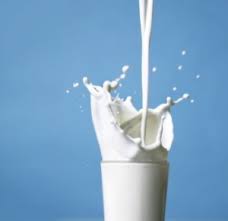 Calcium supplements are the fourth most consumed supplement in the united states. The current recommendation is 1200mg per day, this is equal to about 4 glasses of milk per day. But where did this number come from? How was it decided that everyone needed to be taking in so much calcium? Well, there was a study done in 1986 (Hegsted DM. Calcium and osteoporosis. J Nutr. 1986 Nov;116(11):2316-9.) that demonstrated that taking 1200mg of supplementalcalcium did indeed increase bone density. This bit of news was taken up by the media and supplement companies and voila- a new recommendation to help promote dense bones. Unfortunately it took 10 years before someone asked the question of whether or not taking that much calcium decreased fractures. A 12 year study in 1997 that followed 77,000 women showed that women who drink 2 or more glasses of milk are actually almost 50 percent higher risk of fracture than those who don’t drink milk (Feskanich D. et al. Milk, dietary calcium, and bone fractures in women: a 12-year prospective study. Am J Public Health 1997;87(6);992-7).
Calcium supplements are the fourth most consumed supplement in the united states. The current recommendation is 1200mg per day, this is equal to about 4 glasses of milk per day. But where did this number come from? How was it decided that everyone needed to be taking in so much calcium? Well, there was a study done in 1986 (Hegsted DM. Calcium and osteoporosis. J Nutr. 1986 Nov;116(11):2316-9.) that demonstrated that taking 1200mg of supplementalcalcium did indeed increase bone density. This bit of news was taken up by the media and supplement companies and voila- a new recommendation to help promote dense bones. Unfortunately it took 10 years before someone asked the question of whether or not taking that much calcium decreased fractures. A 12 year study in 1997 that followed 77,000 women showed that women who drink 2 or more glasses of milk are actually almost 50 percent higher risk of fracture than those who don’t drink milk (Feskanich D. et al. Milk, dietary calcium, and bone fractures in women: a 12-year prospective study. Am J Public Health 1997;87(6);992-7).
Here’s an interesting chart produced by a Harvard researcher that showed nearly a direct relationship between calcium intake and hip fractures, i.e the more calcium one took in, the more fractures.
 It turns out that while supplemental calcium may increase bone density some, it also makes bones more brittle. The highly promoted idea that milk builds “strong bones” refers to the prevention of osteoporosis. We’ve been lead to believe that drinking milk and eating dairy products is the best way to do this. In fact, the opposite seems to be true (Am J Clin Nutr 1995;61(suppl 6): 11407S-1415S.). A balanced intake of minerals cannot occur when the diet emphasizes dairy. Dairy’s high calcium content causes relative deficiencies in magnesium and other bone-building minerals, and its high phosphorus content reduces calcium availability. Healthy bones come from a balanced intake of all the bone minerals, including calcium from food, exercise (especially weight lifting) and vitamin D. Here are some great foods and their calcium content .
It turns out that while supplemental calcium may increase bone density some, it also makes bones more brittle. The highly promoted idea that milk builds “strong bones” refers to the prevention of osteoporosis. We’ve been lead to believe that drinking milk and eating dairy products is the best way to do this. In fact, the opposite seems to be true (Am J Clin Nutr 1995;61(suppl 6): 11407S-1415S.). A balanced intake of minerals cannot occur when the diet emphasizes dairy. Dairy’s high calcium content causes relative deficiencies in magnesium and other bone-building minerals, and its high phosphorus content reduces calcium availability. Healthy bones come from a balanced intake of all the bone minerals, including calcium from food, exercise (especially weight lifting) and vitamin D. Here are some great foods and their calcium content .
- Sesame seeds (1 cup = 702 mg)
- Flax seeds (1 cup = 416 mg)
- Cabbage (1 cup = 380 mg)
- Sardines 3 oz(in oil, with bones=324 mg)
- Collard greens (1 cup = 266 mg)
- Spinach (1 cup = 245 mg)
- Orange (1 cup = 104 mg)
- Kale (1 cup = 94 mg)
- Broccoli (1 cup = 62 mg)
1 Response to "Step away from that supplement…."
I am surprised that ” women showed that women who drink 2 or more glasses of milk are actually almost 50 percent higher risk of fracture than those who don’t drink milk”. I always though that those who are non-milk drinkers are more prone to this.
Lara Power recently posted..Mis Sold PPI